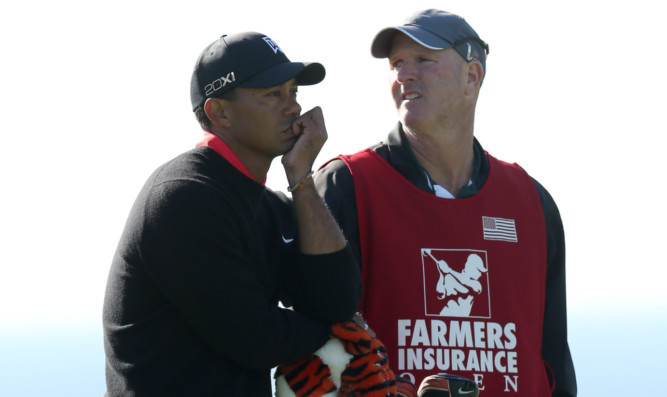
Tiger Woods was right to complain about the slow play that affected him in the final round of his win in San Diego recently.
He was obviously delighted to pick up his 75th PGA Tour victory, but he was less than pleased that it took him over three hours to play nine holes and wrap up the tournament.
Three hours for nine holes is quite simply unacceptable.
When I first played the game as a junior at Bathgate, we were told it should take us under three hours for 18 holes!
Then as a pro on tour, rounds took about four hours, but they’re even longer now. The modern professional would argue that he is playing for life changing amounts of money every week, but that is no excuse.
Golf’s authorities are keen to clamp down on this problem because it’s having an adverse effect on the game.
People see the pros on TV testing the wind, lining up their putts and simply not being ready when it’s their turn to play.
It filters down to the local club where amateurs start to copy that.
It’s OK at the Ryder Cup when so much is stake, but not during a friendly fourball. Too many rounds now take over five hours. It’s putting people off our sport.
Golf has to compete with so many other leisure pursuits nowadays, and time is crucial.
So it’s difficult for a man with a young family to justify going off on a Saturday for a game of golf and being out for seven or eight hours.
There needs to be more general awareness about playing more briskly. And I’m certain it wouldn’t harm people’s games.
But it needs to start at the top and the only way to stop it is with a one-shot penalty.
Financial penalties to wealthy sportsmen don’t do much damage, but nothing hurts a pro more than a one-stroke penalty.
You work hard for a 69 and then the referee tells you it’s a 70 because of slow play. That is a real sickener.
Ross Fisher was penalised when he was in contention at last year’s Wales Open. He wasn’t happy about it, but he hasn’t done it again since. At one stage in his career, Jack Nicklaus was seen as a slow player. He was very deliberate and a few other players complained about him.
But he spoke to chief referee Joe Black, who came up with a plan to help Jack speed up. He took the advice on board and it didn’t do him too much harm!
So if golf’s best-ever player can change his routine, so can everybody else!
Thankfully, in Rory McIlroy we have a great example of how golf should be played.There’s no one quicker round the course than Rory. He’s always ready to play and he doesn’t need a long discussion with his caddie about club selection.
Spectators like to watch him because of this. He smiles, he walks up, hits the ball and keeps moving. And having a good rhythm is beneficial for his golf.
So let’s hope others can follow Rory’s lead and speed up their games.

Enjoy the convenience of having The Sunday Post delivered as a digital ePaper straight to your smartphone, tablet or computer.
Subscribe for only £5.49 a month and enjoy all the benefits of the printed paper as a digital replica.
Subscribe